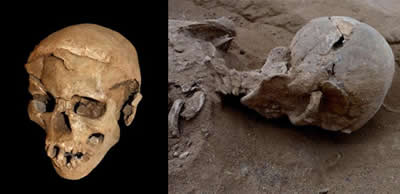Violence in Foraging Societies
 All societies have both peace and violence (though not in the same proportions).
All societies have both peace and violence (though not in the same proportions).
Violence in foraging societies is relatively rare usually caused by sexual jealousy. However, violence against particularly violent group members and violence against members of other groups can also happen.
Remember that, if a group is small, and violence only happens once a decade, then almost everyone has been affected by violence. A little violence means a lot in a small group.
Next: Balancing population and resources
Picture: 2016, discovery of skeletal remains of foragers massacred about 10,000 years ago, Nataruk, near Lake Turkana, Kenya.
Think of it this way: You can see history as a series of wars broken by periods of peace or a series of peaces broken by wars. In popular accounts of history, we tend to do the former (consider all the books, movies, shows about the 20th century's world wars). But it is equally valid to do the latter. All and all, people are probably better at making and keeping peace than they are at making and keeping war (most days people are not fighting battles) but they surely do both.
It's important to note that in human societies, power does not go to the strongest or most willing to use violence. In fact, there is good evidence that individuals who are unusually violent tend to be killed by members of their own group (everyone has to sleep sometime). In human societies, power goes to those who are most politically and socially savvy (though the violent and the politically and socially savvy are not mutually exclusive groups).
 All societies have both peace and violence (though not in the same proportions).
All societies have both peace and violence (though not in the same proportions).